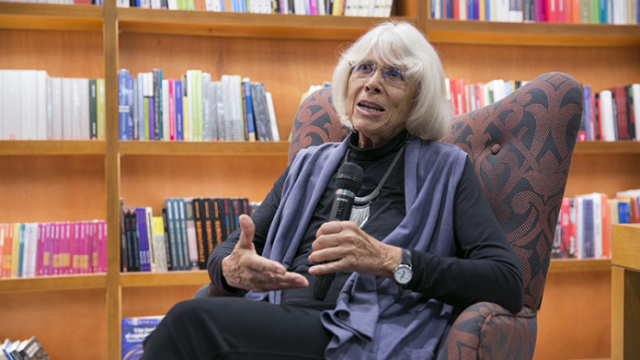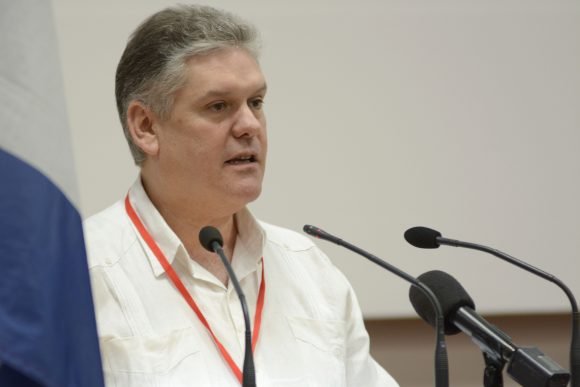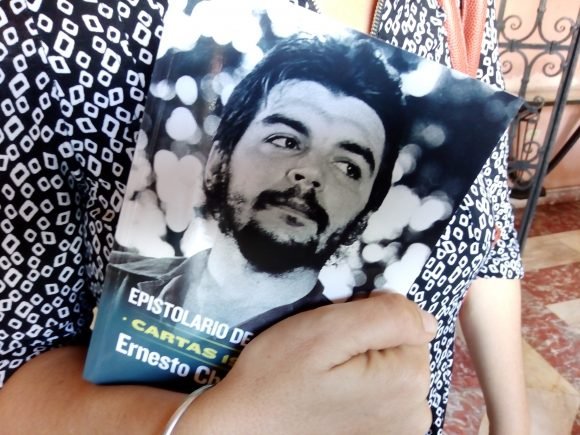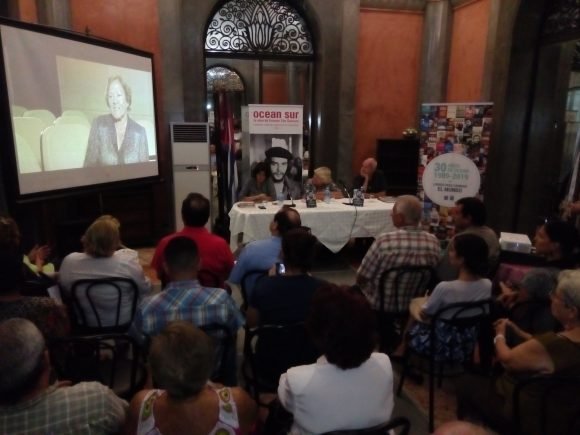Translations 677
Dad’s Pregnant, Too
 Dad’s Pregnant, Too
Dad’s Pregnant, Too
By Vladia Rubio/CubaSí
Sunday, June 16 2019 05:49
Translated and edited by Walter Lippmann for CubaNews

Carrying a new being in the womb not only causes decisive changes in the organism of the future mother. Even the first-time father is sometimes confronted with novelties in his body.
Photos: Yaciel Peña
Deyanira is in her third month of pregnancy and the fatigue and vomiting do not leave her alone. Neither does Osniel.
It’s not a mistake. She didn’t skip a line while reading. Osniel, the husband of the first-time mother, feels afflicted with symptoms similar to hers, but when his stomach turns as if he were on the roller coaster, he tries to hide the situation although sometimes the paleness betrays him.
And it is not that this young and future father is a hypochondriac. No mental illness afflicts him. He is simply going through what others are going through, even if they keep quiet about what they will say and even how they will look at them.
However, scientific research has shown that some parents, especially first-timers, are afflicted with the so-called Couvade Syndrome or empathic pregnancy.
As a result, it has been proven that they suffer interesting biological changes that bring them sensations similar to those of their partner.
They experience an elevation of estradiol levels (estrogen involved in the maternal behavior of mammals associated with tenderness and similar emotions) and a decrease in testosterone levels.
The hormonal variations that are presented to them at the same time that to their companion can generate symptoms similar to those of her as the well-known nausea and vomiting.
At the same time, knowing the good news that they will be parents, the glucocorticoids decrease, a hormone associated with cortisol, which is released as a result of stress.
In parallel with the above, they secrete more prolactin (the hormone related to the ability to breastfeed) and this results in lack of appetite, fatigue, intolerance to certain odors, drowsiness and weight gain.
After the birth of the child, it has also been observed that in certain first-time parents the levels of oxytocin rise as happens in the mother, and this leads to a closer bond with the newborn.

Among the first scientists to investigate the subject, biologist Katherine Wynne-Edwards, from Queen’s University in Kingston, Ontario, notes that along with psychologist Anne Storey, she verified the role of prolactin in the sensations and feelings of the “pregnant father”.
Another study carried out by Dr. Arthur Brennan of Kingston University in London confirmed the decisive role of prolactin, to the point that levels of this hormone increased when parents carried their babies.
It seems to be, according to some experts, that being close to the pregnant wife can influence those unique sensations experienced by some parents. It happens that the saliva and sweat of pregnant women emit chemical signals that impact hormonal changes in their partners.
Husbands who are physically farther away from the bellies do not receive the above-mentioned influences or perceive them in a very slight way.
Parental brains
They assure that the paternity also influences in the brain to the point of increasing the gray matter as a consequence of the many new conduct that they incorporate following the birth of the baby.
All these new ways of doing things are reflected in changes in the brain. This is what Dr. Juan Blanco López states in his thesis to obtain the scientific degree “Men. Masculinity as a risk factor. An ethnography of invisibility”, from the Spanish university Pablo de Olavide.
Although, obviously, men do not experience the arrival of the new being with the same changes that happen in the body and mind of the woman -who, moreover, must give birth to her child-; they are besieged by fears, curiosities and doubts about how to assume the role of parents.

They are so overwhelmed by these feelings that some even suffer from so-called postpartum depression.
In the journal of the Spanish Association of Neuropsychiatry, Dr. Emilia García Castro states in her article Psychology and Psychopathology of Parenthood: “The latest studies have shown that there is indeed postpartum depression in men. It is said to affect between 5% and 10% of fathers, presenting symptoms similar to those of mothers, and is more common in those who do not live with their children or are first-time fathers…… ».
Although they are undoubtedly curious, the perhaps most important changes are not those mentioned so far. Those who really deserve applause are those who have occurred in the ways of conceiving paternity.
Although traditionally, the father figure was seen as the one in charge of giving permission, the voice of authority, and also the provider; interesting transitions in that order have been taking place for some time now.
At present, parents, as a trend, show a cultural transition in their role, opening more spaces to demonstrations of affection and tenderness towards their descendants, at the same time that they are also in charge, to a certain extent, of offering welfare care, that is to say, those referring to cleanliness, food and others.
On an international level, and obviously also on this Caribbean island, there is a growing understanding that children are the equal responsibility of mother and father. Both have the same rights and duties with respect to their offspring.
In Cuba, where paternity research began to glean since the middle of the last century, although an archaic hegemonic masculinity continues to prevail, transitions in that order are also evident.

Third Sunday in June, Father’s Day, Las Tunas, Cuba, June 14, 2012. AIN PHOTO/Yaciel PEÑA DE LA PEÑA/Thm
Stereotypes persist, but the National Gender Equality Survey revealed that 40 percent of men and women interviewed stressed the importance of the father during the childhood of their children.
However, the burdens we dragged poked their hairy ear when nearly 60% said they “agreed” or “partly agreed” that babies need to be closer to their mother than to their father. Fifty-one percent said a man can’t give them the same care as a woman.
A lot has been studied, but there is still a lot of research to be done regarding fatherhood, especially considering that they are increasingly behaving according to their condition of being emotionally active, sensitive beings. Therefore, more and more people are convinced that kissing their son, showing him their tenderness, nothing is left to them and it does contribute to their stature as contemporary parents.

Yankee Bombings and Endless Wars
Yankee Worship of Bombings and Endless Wars

By Manuel E. Yepe
http://manuelyepe.wordpress.com/
Exclusive for the daily POR ESTO! of Merida, Mexico.
Translated and edited by Walter Lippmann.
“From Syria to Yemen in the Middle East, from Libya to Somalia in Africa, from Afghanistan to Pakistan in South Asia, all forming a U.S. air curtain descending on a huge swath of the planet with the declared goal of fighting terrorism. Its main method is summed up in surveillance, bombardments and more constant bombardments. Its political benefit is to minimize the number of “United States boots on the ground” and, therefore, American casualties in the never-ending war on terrorism, as well as public protests over Washington’s many conflicts. It’s economic benefit: plenty of high-performance business for arms manufacturers for whom the president can now declare a national security emergency whenever he wants and sell his warplanes and ammunition to preferred dictatorships in the Middle East (no congressional approval required). Its reality for several foreign peoples: a sustained diet of bombs and missiles “Made in the USA” that explode here, there and everywhere.
This is how William J. Astore, a retired US Air Force lieutenant colonel and now a history professor, interprets the cult of bombing on a global scale that he views in his country, as well as the fact that U.S. wars are being fought more and more from the air, not on the ground, a reality that makes the prospect of ending them increasingly daunting, and finally asks: What is driving this process?
“For many of America’s decision-makers,” Astore says, “air power has clearly become a sort of abstraction. “After all, with the exception of the September 11 [2001] attacks by four hijacked commercial airliners, Americans have not been the target of such attacks since World War II. On the battlefields of Washington, the Greater Middle East and North Africa, air power is almost literally always a one-way street. There are no enemy air forces or significant air defenses. The skies are the exclusive property of the U.S. Air Force and its allies, so we are no longer talking about “war” in the normal sense. No wonder Washington’s politicians and military see it as our strength, our asymmetric advantage, our way of settling accounts with wrongdoers, real and imaginary.
It could be said that, in the 21st century, the count of bombs and missiles replaced the Vietnamese era body count as a metric of false progress. According to U.S. military data, Washington dropped no less than 26,172 bombs in seven countries in 2016, most of them in Iraq and Syria. Against Raqqa alone, the “capital of terrorists,” the United States and its allies dropped more than 20,000 bombs in 2017, reducing that provincial Syrian city literally to rubble. The Raqqqa bombing coupled with artillery fire killed more than 1,600 civilians, according to Amnesty International.
After Donald Trump took office as president, having promised to get the U.S. out of its endless wars, U.S. bombing has increased, not only against the Islamic state in Syria and Iraq, but also against Afghanistan. Civilian casualties increased even when “friendly” Afghan forces have been mistaken for “enemies” and also liquidated.
Somalia’s air strikes on Yemen have also been on the rise under Trump, while civilian casualties due to U.S. bombings continue to be underestimated by the U.S. media and minimized by the Trump administration.
This country’s propensity to believe that its ability to rain infernal fire from the sky provides it with a winning methodology for its wars has proven to be a fantasy of our age. Whether in Korea in the early 1950s, in Vietnam in the 1960s, or more recently in Afghanistan, Iraq, and Syria, the United States can control the air, but that dominance simply has not led to ultimate success. In the case of Afghanistan, weapons such as the Mother of All Bombs (MOAB, the most powerful non-nuclear bomb in the U.S. military arsenal) have been celebrated as game changers even when they changed nothing. (In fact, the Taliban only continue to strengthen, as does the branch of the Islamic state in Afghanistan.) As is often the case when it comes to U.S. air power, such destruction leads neither to victory nor to the closure of anything; only to even greater destruction.
“Such results are contrary to the logic of air power that I absorbed in my career in the U.S. Air Force, from which I retired in 2005,” says Professor William J. Astore.
June 19, 2019.
This article may be reproduced by quoting the newspaper POR ESTO as the source.
Marta Harnecker has Passed Away
Marta Harnecker, one of the greatest figures of the Latin American left, has passed away
**As an author, Marta Harnecker published more than 80 books, including “Elementary Concepts of Historical Materialism”, written in 1969 and now in its 70th edition.
Translated and edited by Walter Lippmann for CubaNews

Chihuahua Chronicle
June 15, 16:25 pm
Chilean writer, psychologist and journalist Marta Harnecker passed away this Saturday.
This activist was born in Chile in 1937 and is recognized as one of the main figures of the Latin American left. She lived in the first person the socialist government of Salvador Allende and managed to survive the violence of Augusto Pinochet’s military coup.
Many were politically formed by her works. Her book “Elementary Concepts of Historical Materialism”, written in 1969 and now in its 70th edition, has been part of the formation of militants of leftist parties.
Of Austrian roots, Harnecker studied Psychology at the Catholic University of Chile in 1962. She did postgraduate studies in Paris with Paul Ricoeur and Louis Althusser. Upon her return to Chile in 1968, she taught Historical Materialism and Political Economy in Sociology at the University of Chile and was director of the political weekly Chile Hoy.
After the 1973 coup, she went into exile in Cuba, where she married Commander Manuel Piñeiro with whom she had a daughter.
There she lived through that country’s heartbreaking “special period” and described as “admirable” the way Cuba confronted the fall of socialism in Eastern Europe and the USSR.
After being widowed in 1998, Harnecker continued her research career and drew on the testimonies and experiences of Latin American political leaders that are part of the articles and texts that are now study material in multiple universities around the world.
Among these experiences is that of Venezuela, where she was an advisor to former president Hugo Chávez and the Ministry of People’s Power, where she was part of the management team of the Miranda International Center [CIM] in Caracas.
During her stay in the South American country, she was able to analyze the flourishing of popular struggles in Latin America.
Marta Harnecker, an authentic Marxist
Marta Harnecker demonstrated that socialism is not a “project” thinkable without struggle and that it cannot be done “from above”, since it must be the product of the struggles of the movement of the peoples and dominated classes.
“In this sense, she is an authentic Marxist, continuing the work initiated by Marx, without fear of enriching it – and permanently taking into account of what is new in the reality of the world, of capitalism, of imperialism, of struggles. Thus renewing the conceptualizations, the theoretical proposals and those relative to the strategies of action”, she was pointed out the journalist Samir Amin in an article published by La Haine.
“She helped to give living Marxism a Latin American dimension, as others have given it an Asian or African dimension. Marta Harnecker helped to give Marxism the universal dimension that should be her own; she helped it to be heard by the great majority of the peoples of the world, which are those of the three continents. She managed to escape Marxism from a deadly Eurocentric imprisonment. The experience of advances in the struggles of the peoples of Latin America has paved the way in recent decades, through the theoretical thought of Marta Harnecker, which has been decisive in this sense,” Amin stressed.
Most recognized works
As an author, Harnecker published more than 80 books: El capital: conceptos fundamentales (1971), Cuba: ¿dictadura o democracia? (1975), Pueblos en armas (1983), La revolución social (Lenin y América Latina) (1985), ¿Qué es la sociedad? (1986); Indígenas, cristianos y estudiantes en la revolución (1987); América Latina: Izquierda y crisis actual (1990); Haciendo camino al andar (1995); Haciendo lo imposible: La izquierda en el umbral del siglo XXI (1999); Reconstruyendo la izquierda (2006) and Un mundo a construir (nuevos caminos) (2013), for which he won the Premio Libertador al Pensamiento Crítico .
Harnecker, who suffered from cancer, spent his last years between Cuba, where his daughter resides, and Canada, together with her husband, the outstanding intellectual, Michael Lebowitz.
World Day Against Elder Abuse

World Day Against Elder Abuse. How to Avoid Mistreatment?
June 15, 2019
Translated and edited by Walter Lippmann for CubaNews.

The UN details that the number of people over 60 or more is expected to double by 2050. Photo: teleSUR.
June 15 was designated by the UN General Assembly as the World Day for Awareness of Old Age Abuse.
Elder abuse is a social problem that affects the health and human rights of millions of older adults around the world, a single or repeated act that causes harm and suffering.
The World Health Organization (WHO) indicated that the magnitude of this problem is quite wide, since according to a study conducted in 2017, at least 15.7% of people over 60 were subjected to some form of abuse.
The agency indicated that the number of violence against older adults could be even higher, but of 24 cases of abuse in old age only one is reported, justified by their fear of notifying their relatives, friends or authorities of the abuse.
In 2018, the WHO revealed that psychologically abused older adults accounted for 11.6%, economic abuse 6.8%, neglect 4.2%, physical abuse 2.6%, and sexual assault 0.9%.
Faced with this problem, the UN agency has urged taking precautions so that this does not continue to happen, and thus mitigates the consequences.
Among the measures taken are “awareness campaigns for the public and professionals (detection of possible victims and aggressors), inter-generational programs in schools, interventions to support caregivers (e.g. stress management, respite care).
There are also “policies on residential care to define and improve the level of care, dementia training for carers,” among others.
Among the efforts that WHO called on citizens to prevent abuse from proliferating are “mandatory reporting of abuse to authorities, self-help groups, shelters and emergency shelters, counselling programs for those who inflict abuse, hotlines to provide information, and caregiver support interventions.”
The Red Cross launched a campaign that seeks to raise awareness to end the abuse of older adults, with the slogan: “Although you do not know, it is also mistreatment,” which calls for making visible that these actions that are unjustifiable.
The UN said that the number of older people, i.e. those aged 60 and over, is expected to double by 2050 and triple by 2100: from 962 million in 2017 to 2.1 billion in 2050 and 3.1 billion in 2100, so it is important to prevent the growth of elder abuse from continuing.

The Red Cross launched a campaign to raise awareness to end the abuse of older adults. Photo: The Andes.

In Cuba, attention to and respect for older adults is a priority. Photo: Abel Oadrón Padilla/ Trabajadores.
Workers must create their company’s plan

Cuban Minister of Economy:
Workers Must Create Their Company’s Plan for 2020
Alejandro Gil, Minister of Economy and Planning, at the eighth Congress of the National Association of Economists and Accountants of Cuba. Photo: Ariel Ley Royero/ ACN.
 By Lissett Izquierdo, Cubadebate journalist. Graduated from the University of Havana (2014). She worked at the Cuban News Agency from 2011 until September 2018.
By Lissett Izquierdo, Cubadebate journalist. Graduated from the University of Havana (2014). She worked at the Cuban News Agency from 2011 until September 2018.
and Ferrer Ariel Ley Royero
Translated and edited by Walter Lippmann for CubaNews.

Alejandro Gil, Minister of Economy and Planning, at the eighth Congress of the National Association of Economists and Accountants of Cuba. Photo: Ariel Ley Royero/ ACN.
The Cuban economy plan for 2020 will have a new conception: it will be elaborated without specific directives or limits, since it will come out of the active participation of workers in each company, informed Alejandro Gil, Minister of Economy and Planning (MEP), this Wednesday.
Speaking at the inaugural session of the VIII Congress of the National Association of Economists and Accountants of Cuba (ANEC), at the Havana Convention Center, the Minister argued that planning will become a collective construction, in which the potentialities of the country’s entities are identified.
Gil reminded the delegates and guests that up to the moment a global model of the economy was made, from which the specific directives for sectors came out, that is to say, the requests for goods and services, as well as the pre-defined level of imports and exports that the economy would have.
According to Gil, now “there is no straitjacket,” but we will have to be objective, realistic and conscious. This new way, demanded for years by the workers, also requires a change of mentality, because “there will be those who are used to the numbers coming from above,” said the minister.
For this reason, he said, this process – which is currently taking place in the labor collectives – will require the support of ANEC and the Central de Trabajadores de Cuba (CTC). “The plan that is built has to be by nature more efficient than the one that came from the top down.
Gil ratified that for next year, in the midst of the restrictions that the country presents and the tightening of the blockade imposed by the United States, growth and development can be guaranteed due to the existence of human capital, a national industry with potentialities to be better exploited and a more diversified foreign trade.
Among the priorities, he mentioned activities related to food production, housing programs, transportation, computerization and medicines. The financing of national industry will also take precedence.
In the words of the head of the MEP, one of the problems that hinders the performance of the Cuban economy is the persistence of a mentality that is highly dependent on imports. In recent years there has been a trend towards increasing purchases abroad, which has an impact today, he argued.
He explained that goods are imported that with efforts can be produced within the country. For example, animal feed for pigs, because when there are failures in their purchase, the production and commercialization potholes appear, as happened in the last quarter of last year.
“The economy must prepare itself to gradually reduce these purchases, although it will not be resolved immediately,” he said.
In agreement with Gil, one of the ways to strengthen national industry is to promote productive chains, based on policies and financial incentives. It has also been conceived to strengthen local development projects, based on the use of the endogenous resources of the territories.
Another topic discussed by the Minister of Economy was that of investments. He commented that not infrequently there are differences between feasibility studies and yields. In these studies, scientific rigor must prevail, he said.
He added that the return on investment is little analyzed, when the most important thing is the examination of the expected result of the investment and how it impacted the economy.
Economists committed to the development of their country

Eighth Congress of the National Association of Economists and Accountants of Cuba, at the Havana Convention Center. Photo: Ariel Ley Royero/ ACN.
In the opening remarks, Oscar Luis Hung Pentón, president of ANEC, reiterated the commitment of the more than 80,200 members of the organization to the process of updating the Cuban economic model.
In reviewing ANEC’s performance in recent years, Hung Pentón highlighted the activity of improvement, especially of officials and specialists in the state sector of the economy, as well as the development of science.
On the other hand, the working links between ANEC and the Permanent Commission for the Implementation and Development of the Guidelines constitute an expression of the close communication existing today between the governmental structures, directly involved in the transformations of the economy, and the prevailing Cuban economic thought in the civil society, said the expert.
The meeting was attended by Jorge Cuevas Ramos, member of the Secretariat of the Central Committee of the Party and Head of its Economic Department; Meisi Bolaños, head of Finance and Prices; and Abel Prieto, director of the Martiano Program Office and president of the José Martí Cultural Society.
Epistolary of a Time

Epistolary of a Time:
Che Guevara Lived Through His Letters
By István Ojeda Bello
Translated and edited by Walter Lippmann for CubaNews.

In the book Epistolario de un tiempo. Letters 1947-1967 Ernesto Guevara brings together Che’s most famous missives Photo: István Ojeda Bello/ Cubadebate.
For the first time, readers have in the same volume all the known letters of our Heroic Guerrilla, thanks to the joint effort of Ocean Sur Publishing House and Che Guevara Study Center with the Epistolary book of a time. Letters 1947-1967 Ernesto Guevara.
The text was presented this Friday at the Casa de la Amistad in Havana with the presence of relatives of the Argentinean-Cuban revolutionary fighter; and Fernando Rojas, Vice-Minister of Culture; Fernando González, Hero of the Republic of Cuba and president of the Cuban Institute of Friendship with the Peoples, as well as Adán Chávez Frías, ambassador of the Bolivarian Republic of Venezuela in our country.
In Epistolario de un tiempo… Che’s most famous missives converge, such as his farewells to the Cuban people and their children, along with another appreciable number of letters that denote his communication with figures of the politics, art and society of his time, such as Haydée Santamaría, Armando Hart, Celia Sánchez, Carlos Rafael Rodríguez, Regino G. Boti, Nicolás Guillén, Ernesto Sábato or Lisandro Otero, as well as his messages or reflections with institutions, media and ordinary citizens.
Many of these documents had remained unpublished until now, noted researcher Disamis Arcia Muñoz who along with Dr. Maria del Carmen Ariet Garcia was in charge of the compilation.
This book, he emphasized, helps to clarify controversial moments in the life of the Guerrilla of America as his discrepancies with other revolutionary fighters; but also to give a more intimate look to his conversations with close friends and even with strangers.
Arcia Muñoz stressed the importance of making known the epistle that Che sent to Fidel Castro on March 26, 1965. It, he affirmed, together with Socialism and Man in Cuba, and its inconclusive Critical Notes on Political Economy, completes the Guevara triad of thinking about the Cuban Revolution from its external projection, its technological development and the problems of socialist transition.
When reading several passages of the text, Aleida Guevara March noted that many of the realities described by her father can be appreciated in contemporary times. She also emphasized how, through the letters, we know this tender and paternal angle of a man who articulated sensitivity and sense of humor with a high sense of duty and self-criticism. “In this book you can find those things,” she concluded.

Presentación del libro Epistolario de un tiempo. Cartas 1947-1967 Ernesto Guevara. Foto: István Ojeda Bello/ Cubadebate.
Provocation Disguised as a March
 POSTCUBA
POSTCUBA
Cuba: Defenders of a Provocation Disguised as a March
By Marco Velázquez Cristo
Undated. Translated June 1, 2019.
Translated and edited by Walter Lippmann for CubaNews
The approval of the new Constitution by the great majority of the Cuban people generated much frustration in the feverish minds of Miami and of government officials of the country in which they reside. Their brutal media campaign, money sent and influences carried out, could not avoid the failure of their intentions to achieve a result contrary to what was obtained.
Faced with this fact, which is inserted in the midst of an intensification of the aggressiveness of the U.S. administration, mainly towards Venezuela and Cuba, whose revolutions they wish to destroy for well-known reasons, they have decided:
To carry out actions on the physical stage accompanied by media campaigns that position opinion matrices that create doubts about the implementation of what is established in the new Magna Carta. [These include] promoting the idea that the government swindled the people and that the rights contained therein will not be allowed to be exercised.
As part of this action, they invoke, among others, its Article 56 that establishes: “The rights of assembly, demonstration and association, for lawful and peaceful purposes, are recognized by the State provided that they are exercised with respect for public order and compliance with the requirements established by law. According to the “scholars” who play games with our enemies, this article was violated because the “march” of May 11 had a lawful purpose and respected public order.
Let’s analyze.
The efforts of notorious counter-revolutionary ringleaders to transform it into a political provocation stripped it of its true essence in the struggle against homophobia and transphobia. These known and opportunely-denounced intentions motivated its non-authorization, which deprived it of its licit [legal] character. I remind those who like academicism that the word licit is an adjective that refers to that which is authorized. Besides, what the mentioned elements wanted to do had nothing licit, as was later shown.
With regard to respect for public order: The mere fact of contravening what a member of the police has indicated to a person or group of persons constitutes a violation of public order. In addition, the street is a public good of infrastructure and its private use whatever its purpose requires an enabling title that must be granted by the public administration and lacked the march that.
In addition to not having the proper authorization [which they had] not planned to secure, which could have caused, as repeatedly explained by the authorities to the participants, interruptions and other inconveniences in traffic and even possible accidents on a road as important as Malecón.
The march of marras was, in reality, an attempt at a 0political provocation with divisive and destabilizing ends, orchestrated from the unscrupulous manipulation of the feelings of the members of the LGBTI community, as we denounced in the post “Cuba: March or chronicle of an announced provocation” where we stated:
“… the orientations coming from Miami are: to encourage the holding of public marches with apparently innocuous motives that leave the government without arguments to prohibit them or else doing so generates the rejection of the sectors of the population that are affected. Take advantage of those authorized to “denounce violations of human rights and democratic liberties.
The enemy put its media machine and its network of internal lackeys into action in a vain attempt to confuse public opinion, presenting this provocation as a genuine march of the LGBTI community.
To this were lent some who, without being part of the traditional counterrevolution, acted as this one, jumping exalted to the stage of the internet to dance an unbridled cancan against state institutions and their leaders, sharing the stage and singing in tune with the flower and cream of the internal and external mercenarism that rewarded them with their applause and the publication of their diatribes against what they say they want to preserve.
I am not referring to members of the LGBTI community, but to those who, despite the publication of videos, interviews with LGBTI activists, exposed arguments and demonstrated who were behind the march and the reasons why it was not authorized. They try to make all this invisible and insist on questioning the authorities and describing their actions as repression when it is evident that they did not exist.
Among these, there are those who, in order to sustain their criticisms, allude to similar ones made by public personalities who do not understand that, in Cuba, the validity of opinions is not measured by the sector of society from which they come, nor by the person who makes them. This is because the Constitution that they so like to invoke establishes that we all have equal rights and worth. We do not all practice adultery, nor do we consider anyone to possess a superior intelligence or above the rest of those who debate in the social media.
Others who reacted hysterically at first, now cautiously keep silent or nuance their approaches perhaps thinking it will save their honor. Someone in the networks expressed their hope that they would publicly rectify their conduct. This has not yet happened [and so] they are too arrogant to acknowledge their “mistake” or simply prefer to remain silent so as not to disdain what they consciously expressed knowing perfectly that it was not true.
These fools, whose egocentrism and vanity lead them to believe that they have the power to speak on behalf of the people are those who repent, even if they say the opposite of ever having shown themselves to be revolutionaries. Every day their discourse and interests move further away from that which they claim to defend.
People who, in contrast to them: They do not deny or repent of their work, they do not seek excuses to justify having erected it, they do not cease to create because they continue to believe in it, they do not contradict or practice political equilibrium, they continue to sing to their Revolution with pride and without fear of defeats that will never come.
In the conduct of those who claim to be paradigms of the struggle for the rights of the LGBTI community, there is much hypocrisy, opportunism and false concern for the destinies of the revolution.
The institution which has truly led the struggle against Homophobia and Transphobia and for the recognition of the rights of the people who make up the LGBTI community has been the National Center for Sex Education (CENESEX). Its main directors did not irresponsibly throw themselves at the networks to question the decision taken. They were informed, understood its need and supported it. They placed their trust in the institutions of the Revolution, not in the manipulative word of the enemy.
In my opinion, whoever agrees with the adversary, gives him credit, scandalizes in his favor, does not believe in state institutions, demerits its actions, forecasts an uncertain future for the Revolution, cannot be a revolutionary. All the more so if this type of behavior coincides with moments of danger for the homeland like the present ones.
5 Benefits of Cuban Coffee
 5 Benefits of Cuban Coffee
5 Benefits of Cuban Coffee
By Pacotillas – Envíos a Cuba
Translated and edited by Walter Lippmann for CubaNews.
Undated. Translated June 14, 2019.

The 5 benefits of Cuban coffee, that anyone who can taste it can feel these noble benefits of such delicious coffee.
In Cuba, it is usually drunk in the morning, hot and freshly brewed. Its aroma awakens the greatest yearnings of the morning for anyone who likes a good Cuban coffee.
And here you have 5 benefits of the tasty Cuban coffee:
A good Cuban coffee, taken very hot especially in the mornings or at noon, maintains the state of alert and also greatly favors the relief of some headaches and sometimes some types of migraines you may have.
That is why it is customary to take it in the mornings. The feeling is unique and the mood is much more satisfying or greater.
The states of alert and concentration are usually improved once the coffee is drunk in the morning or when necessary.
Energy levels tend to increase.
And this is because Cuban coffee, like other types of coffee beans, contains caffeine in its chemistry.
And this substance tends to increase the levels of energy in the body, because it acts directly on the nervous system.
So the body is reflected in less tiredness, greater concentration, and high energy levels.
Some functions of the organs are benefited. Among them are the reduction of gallstones and some diseases related to the gallbladder, decreases the chances of diseases associated with the heart, decreases the risks of suffering from liver cancer, among many other benefits.
As for memory-related diseases, a good cup of coffee can help reduce Alzheimer’s and Parkinson’s related diseases, according to studies that have shown this.
The social relations and between friends are favored, because a good cup of coffee offered in some visit favors the exchange and healthy relations between friends and relatives. Cubans are accustomed to serving it during any meeting or visit between friends. They enjoy having a good cup of coffee with company and chatting for a while.

These, among so many others, are the benefits of having a good cup of coffee, which revitalizes the body and increases the feeling of pleasure and well-being.
Cuban coffee, one of the tastiest in the world, is to savor and share in the company of friends and family.
Socialism’s Rebirth in the United States
Rebirth of the Socialist Option in the United States.

By Manuel E. Yepe
http://manuelyepe.wordpress.com/
Exclusive for the daily POR ESTO! of Merida, Mexico.
Translated and edited by Walter Lippmann.
The electoral failure of center-left and center parties in Europe and North America has provoked a timid shift to the left in U.S. politics and is encouraging a modest renaissance of the “socialist” option.
With the marginalization of the Social Democratic Party of Germany, the Socialist Party of France and the Italian Democratic Party by voters angered by their parties’ shift to the right, it was inevitable that some of the leaders of these political formations would project a new orientation, somewhat more to the lef.t. It remains to be seen whether they will implement it. In line with this sentiment, the British Labour Party and the Socialist Party of Spain have made popular advances based on left-wing positions that, in most cases, reproduce the social democratic formulas of the mid-twentieth century.
This is how the acclaimed American communist journalist and writer Greg Godels analyzes it in a thorough work about the situation that left-wing and progressive political organizations in the United States are going through today.
In the United States, the reaction to Hillary Clinton’s defeat in the 2016 elections generated further rhetoric to the left and the emergence of an important moderate social-democratic faction within the US Democratic Party.
It is driven by the energetic and youthful “veterans” of Bernie Sanders’ campaign called “Sandernistas”. They rally around the social democrats in the United States. The new left of the Democratic Party is trying to transform the old party. Meanwhile, opponents of this trend from the left, both inside and outside the Party, attack them using every possible resource, says Godels.
This, of course, raises the question of where the left is going. In the U.S., the failure to secure deep roots for an independent, internationalist, principled and revolutionary socialist movement – not totally absorbed by bipartisan electoral politics – means that the genuine politics of the left will have to suffer for the next 17-18 months from the bipartisan electoral circus, with guaranteed unsatisfactory results.
The distractions caused by the absurd RussiaGate, the political trial, the Twitter wars and the mistakes of some celebrities, mean that the fate of Venezuelans, Iranians, Palestinians and many poor and exploited Americans will remain in the hands of the crazy foreign policy team of Trump, a group of which the top of the Democratic Party refuses to shake off.
“We have found a worrying trend toward the normalization of the positive connotation of socialism,” the Victims of Communism (VOC) Foundation bitterly asserted. But most Americans understand socialism very differently from the traditional scientific concept.
According to the VOC study, only 9 percent of respondents associate the idea of socialism with Karl Marx and Friedrich Engels. The most popular reference is Sanders, followed by the leaders of the liberal wing of the Democratic Party Barack Obama and Hillary Clinton and the New Deal policy set in motion by Franklin D. Roosevelt during the Great Depression.
Some Americans call developed countries with notable official economic regulation socialist: Sweden, Canada and France, even leaving behind nations that explicitly declare their socialist character, such as China, Vietnam, Cuba, Democratic Korea and Venezuela.
For now, Bernie Sanders seems likely to win the nomination and become the Democratic Party’s presidential candidate.
Unlike the situation three years ago, Sanders would now have to compete with other representatives of the left wing of the Democratic Party. This wing, while not defining themselves as socialists, share some of his more progressive proposals, such as Kamala Harris, Elizabeth Warren and Kirsten Gillibrand, who have supported the fuller version of the free universal health care system proposed by Sanders. Together, they would account for 19% of voters in the primaries, according to this poll.
Since the November 2020 presidential election would probably be the last for Sanders, who will then be 79 years old, it is suspected that his advanced age would lead him to nominate a younger person of a different gender as a vice presidential candidate.
Whatever Sanders’ electoral career, the spread of skepticism toward capitalism within U.S. society results from the country’s socioeconomic status and is objective and positive, experts say.
June 13, 2019.
Sino-Russian Strategic Alliance
China and Russia in Strategic Alliance

By Manuel E. Yepe
http://manuelyepe.wordpress.com/
Exclusive for the daily POR ESTO! of Merida, Mexico.
Translated and edited by Walter Lippmann.
The Russian magazine of the Strategic Culture Foundation (FCE) published on 7th June an important editorial dedicated to highlighting the strong contrast between the strategic alliance for the 21st century that is being consolidated between China and Russia and the situation of enmity and confrontation that can be seen among Western leaders.
Russian President Vladimir Putin received his Chinese counterpart Xi Jinping in Moscow this week for a three-day state visit.
The meeting not only enhanced the personal affection cultivated among them in nearly 30 meetings over the past six years. President Xi referred to Putin as a close friend and a great international ally.
Even more important is the fact that the two nations are solidifying a strategic alliance that could define the geopolitics of the 21st century, the FCE editorialist considers.
Putin and Xi – who also recently attended the International Economic Forum in St. Petersburg – signed a series of bilateral trade agreements there that will boost Eurasian development and, indeed, global development.
Of particular importance is the continued drive by Moscow and Beijing to conduct international trade in national currencies, thus avoiding the use of the US dollar as a means of payment in international transactions. This is a crucial step in countering Washington’s purported hegemonic control of the global financial system.
Washington today abuses its privileged position of printing or retaining dollars to impose its imperial domination before the eyes of the world. This abuse must stop, and it will stop when Russia and China pave the way for a new, fairer mechanism of international finance and trade.
The policy of cooperation and partnership between equals described by Putin and Xi is based on mutual respect and peaceful prosperity. This vision is not only for those two nations, but for all the others because this policy implies a multi-lateral world without any kind of subjection. In the context of these principles, the consolidation of the alliance between Russia and China represents hope for a peaceful future for the planet, the Russian magazine of the FCE writes.
This positive view is especially welcome at a time when the United States, under President Donald Trump, has unleashed great tension and multiple conflicts in its attempt to shore up its deteriorating global dominance.
The United States is exerting sanctions and threats on numerous nations, including Russia and China, and is doing so even to its supposed allies in Europe, all in a desperate attempt to assert its hegemonic and uni-polar power.
This Imperial policy is the negation of the policies of solidarity and partnership outlined by the Russian and Chinese leaderships. The American style is not only useless, but above all it leads to destruction and war. A path by which, in short, nobody wins, says the FCE editorialist.
History has shown where a policy like the American one leads. In the 20th century, two horrendous world wars were fought – with nearly 100 million dead – largely due to imperialist rivalry.
Russia and China were the two nations that suffered the most in these conflagrations. Both know the horrible cost of conflict, but also how precious peace is. That is why it is encouraging to see those two countries forging a new paradigm of international cooperation based on solidarity and commitment to the development of the common good of all nations.
While Putin and Xi contribute to a solid project for the future, those of the United States and some other Western countries publicly show their disagreements. The false camaraderie of Western leaders is disproved by their ongoing disputes and rivalries. Trump and other European leaders have just celebrated the 75th anniversary of the Normandy landing in June 1944, a military event that announced the opening of the Western front in Nazi-occupied Europe. It contributed to the defeat of the Third Reich, but it was by far not the most important battle. The so-called D-Day was not a definitive milestone in the course of the war.
The historical truth is different. It is indisputable that it was the Soviet Red Army and the colossal sacrifices of Soviet citizens that constituted the fundamental force to defeat Nazi Germany and achieve the liberation of Europe from fascism. The momentous Battle of Stalingrad, which destroyed the Nazi war machine, ended in February 1943, some 16 months before the Western Allies launched their “D” day.
Western leaders enjoy smugly speculating about alleged past glories. This vanity fair does not change the historical record or objective truth. Those who do not learn from history repeat their mistakes and fall back into a dead end. They are leaders who are afraid of the future, says the FCE.
*This article can be reproduced by citing the newspaper POR ESTO! as a source.
Subscribe to Blog via Email
| M | T | W | T | F | S | S |
|---|---|---|---|---|---|---|
| 1 | ||||||
| 2 | 3 | 4 | 5 | 6 | 7 | 8 |
| 9 | 10 | 11 | 12 | 13 | 14 | 15 |
| 16 | 17 | 18 | 19 | 20 | 21 | 22 |
| 23 | 24 | 25 | 26 | 27 | 28 | |



You must be logged in to post a comment.